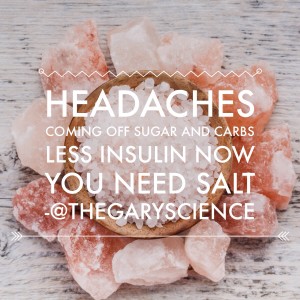 Cutting back on your sugar and carbohydrates will generally leave you craving salt on top of the other emotional and chemical ties you have with sugar.
Cutting back on your sugar and carbohydrates will generally leave you craving salt on top of the other emotional and chemical ties you have with sugar.
Most of us eating a Lower Carbohydrate and Healthy Fat lifestyle feel the need for more salt. We certainly do in our house.
Here’s the science. Insulin is central once again. Carbohydrate is just glucose.
When you have a food intake full of carbohydrate then that is a massive glucose load to the system. You will be surprised to know how much glucose is in bread, rice, pasta and potato.
The body can only effectively metabolise 1 teaspoon of glucose into the brain and muscle. Anything that you take in above that is turned into fat under the direct effect of insulin. The indirect effect of insulin is to retain salt via the kidneys.
If you have a high carbohydrate load as part of the SAD (Standard Australian Diet) lifestyle then you will be needing to produce a lot of insulin to turn that carbohydrate into fat and that means a lot of insulin production.
That in turn means salt retention and that is linked with fluid retention, hypertension and cardiovascular disease.
Once you decrease the carbohydrate intake then the flow on effect is a relative increase in salt excretion. That in itself is the body normalising but some of you can feel the headaches come on.
Simple remedy is to up the salt intake.
Add salt to the nuts.
Add salt to the meats.
I like salted butter.
Try a spoon of Vegemite.
Add salt to broths which are rich in nutrients.
Natural salt versus Iodised salt?
The purists will argue against iodised salt because of its processing. Here in Tasmania there is a high rate of Iodine depletion conditions such as thyroid disease. Iodised salt has helped the community as a whole.
Are the ‘natural’ salts better. A quick look around the internet reveals an enormous amount of hype and marketing on one form over another. And a lot of chemical analyses suggesting a whole lot of chemicals in the mined rock salts.
The simpleton in me says keep it simple. Evaporated sea salts are probably the cleanest but you still need some Iodine. Other natural sources of Iodine include fish, dairy, eggs and seaweed. So you need real food along the way, particularly if you are in an Iodine depleted community.
http://www.nature.com/ki/journal/v40/n2/abs/ki1991207a.html
http://jap.physiology.org/content/108/2/245
http://hyper.ahajournals.org/content/14/4/367.short
#nutritionforlife